09 May, 2023, 17:00Auditorium, HCU
Prof. Dr. Malene Freudendal-Pedersen (Aalborg University)
Mobilities and urban imagination: Who or what are we planning for?

Image © Mette Frandsen.
Abstract
Mobilities and their infrastructural systems have been at the centre of city planning for the last 100 years. The close connection between the development of infrastructures and economic growth has become a primary objective bypassing most other concerns, and this is what we can see from much city planning during the last century. The firmly entrenched discourse that more mobility creates more growth means that city planning has centred on creating infrastructural systems that are dominated by an autologic which is the internal growth logic of planning systems and policies, and which maintains a rational planning paradigm. As such, modern planning concepts are guided by the idea that it is possible to develop better planning and make better decisions for society when a perfect allocation of knowledge and expertise can be secured. But changing focus and also incorporating the emotions and utopias nested in everyday life is an approach to planning that requires re-thinking mobility in and with society. Through this approach, a significant potential for alternative ways of planning the future of urban mobilities emerges. Instead of relying on even more complex models and simulations, these set up an interdisciplinary social structure where everyday life and storytelling can generate a new argumentative rationality and construct desirable mobilities futures. Storytelling enhances what Hajer (2015) calls ‘ontological expansion’, i.e. the transformative capacity of planners to create things that don’t exist, to use imagination and emotions to develop futures that people want to participate in. Examples of urban planning projects will be used to illustrate this point.
About the lecturer
Malene Freudendal-Pedersen is a professor of urban planning at Aalborg University and has an interdisciplinary background linking sociology, geography, urban planning, and the sociology of technology. Her research focuses on mobilities practices and their impact on cities, societies, and everyday life. She is the co-founder and editor of the journal Applied Mobilities and the book series Networked Urban Mobilities, both at Routledge. Malene’s newest book, Making Mobilities Matter, develops a theoretical framework for understanding everyday life and its mobilities in a mobile risk society and critiques the technocratic views that still dominate transport politics and research.
More information
https://vbn.aau.dk/en/persons/111294